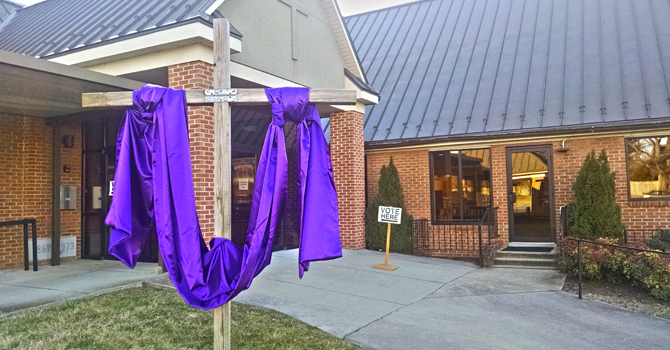Arriving at Massanutten Presbyterian Church, my polling place, on primary day here in Virginia, I once again encountered the Holy Spirit in her ministry of annoyance. There in the churchyard stood a large wooden cross, draped in purple, appropriate for Lent. And just behind it, a small sign, next to a walkway, announcing, “Vote here.”
I was being invited to vote in the shadow of the cross.
It gets better: walking toward the fellowship hall where I was to fill out my ballot, I glanced into the sanctuary and saw the baptismal font. And all I’d been thinking about was going to Starbucks after voting. Holy annoyance, again.
Faithful folk live their lives at a nettlesome intersection of competing narratives, as the Spirit reminded me on primary day. There is the narrative of the gospel, learned through teaching, worship, fellowship, study and the day-to-day ministry of living in human community. Then there is the narrative of citizenship, which invites us to live responsibly in the ephemeral, fragile construct we call a nation.
There is a popular, facile technique for sanding off the rough edges between these narratives, making them appear to fit together almost seamlessly.
The theological term for it is syncretism, and the Old Testament offers up a template example in the account of the golden calf in Exodus 32. While Moses is up on Sinai receiving the Ten Commandments (and much more -- check the text) from God, the folk down below grow restless, petition for a recall to elect a new prophet-in-chief and draft Aaron, Moses’ brother, to write a creative liturgy of liberation from the God on the mountain.
Aaron -- with internal polling indicating near-nil confidence in Moses -- puts stylus to clay, comes up with a hymn to a local fertility deity and calls for gold with which to give the critter form and substance: the famous golden calf. Aaron’s hymn quickly shoots to No. 1, naming the golden calf as the agent of Israel’s liberation from slavery in Egypt.
Rough edges gone, narratives reconciled, manna every morning, credit to the golden bauble.
The contemporary counterpart to Aaron’s hymn is the myth of America as Christian nation, daily chanted in this volatile political season. The myth takes many forms and appears in various editions but has at its core the conviction that, somehow, the gospel lay at the foundation of the republic back in the day, became sidelined across the years and now must be reinstalled as the center of civic life.
(For an excellent, brief summation of the complexity of religion’s involvement in the founding, see Ben Witherington’s blog post “A Myth of Origins: America’s Christian Founding Fathers?”)
From this foundational conviction issue all sorts of position papers, pieces of legislation and heated polemics. This project of sanding off the rough edges between the gospel and the Constitution has produced any number of latter-day golden calves, among them the Mississippi Senate’s recently passed bill authorizing churches to organize ecclesial militias, each congregation naming its own sergeant-at-arms.
The Second Amendment and Sermon on the Mount made compatible. Aaron’s hymn all over again. Let’s save the Ten Commandments on the courthouse lawn for another day.
The attraction of syncretism lies in its seductive suggestion that competing narratives may always be reconciled -- synthesized -- such that little thought, prayer or spiritual engagement need be expended at life’s troublesome intersections. Surely, we think, there is some pleasant route through the middle.
But on Election Day, the Spirit annoyed me with that glimpse of the font, which -- for faithful folk -- always stands prior to the ballot box. The grace poured out abundantly in the water of the sacrament is both promise and invitation: promise that the God whom Moses met on the mountain and who became incarnate in Jesus of Nazareth has self-invested in our lives in ways sometimes apprehensible, often mysterious, blessedly irrevocable; invitation to live out the implications of the incarnation in honest, rough-edged witness in the midst of life’s most vexing and contentious dilemmas. Incarnation means there just may not be a clear, easy way through the midst of the cultural conflict.
John and Charles Wesley had a phrase that still captures the blessed, difficult work of living the life of the baptized in the crucible of a contentious culture. The Christian life, they said, ought to be a symbiosis of “knowledge and vital piety,” a balance of head and heart, of the intellect and the emotions.
Grounded in the faith as articulated in the midst of faithful Christian community, they thought, baptized folk would be equipped to live gracefully and responsibly as citizens, always in the shadow of the cross.









